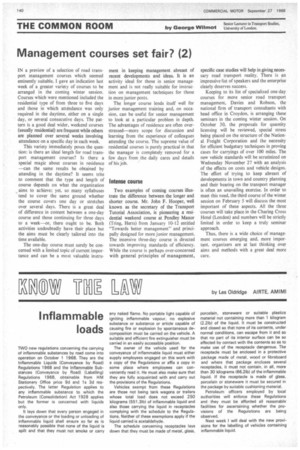Management courses set fair? (2)
Page 142

If you've noticed an error in this article please click here to report it so we can fix it.
IN a preview of a selection of road transport management courses which seemed eminently suitable, I gave an indication last week of a greater variety of courses to be arranged in the coming winter session. Courses which were mentioned included the residential type of from three to five days and those in which attendance was only required in the daytime, either on a single day, or several consecutive days. The pattern is a good deal wider, weekend courses (usually residential) are frequent while others are planned over several weeks involving attendance on a specific day in each week.
This variety immediately poses the question: is there an ideal length for road transport management courses? Is there a special magic about courses in residence —can the same results be obtained by attending in the daytime? It seems trite to comment that the type and length of course depends on what the organization aims to achieve; yet, so many syllabuses tend to cover the same ground whether the course covers one day or stretches over several days. There is a great deal of difference in content between a one-day course and those continuing for three days to a week—or, there ought to be. Both activities undoubtedly have their place but the aims must be clearly tailored into the time available.
The one-day course must surely be concerned with a limited topic of current importance and can be a most valuable instru
ment in keeping management abreast of recent developments and ideas. It is an activity ideal for those in senior management and is not really suitable for instruction on management techniques for those in more junior posts.
The longer course lends itself well for junior management training and, on occasion, can be useful for senior management to look at a particular problem in depth. The advantages of residence are often overstressed—more scope for discussion and learning from the experience of colleagues attending the course. The supreme value of residential courses is purely practical in that the manager is completely removed for a few days from the daily cares and details of his job.
Intense course Two examples of coming courses illustrate the difference between the longer and shorter course. Mr. John F. Hooper, well known as the secretary of the Transport Tutorial Association, is pioneering a residential weekend course at Pendley Manor (Trine, Herts) from January 10-12 entitled "Towards better management-. and principally designed for more junior management. The intensive three-day course is directed towards improving standards of efficiency. While the course is perhaps over-concerned with general principles of management, specific case studies will help in giving necessary road transport reality. There is an impressive list of speakers and the enterprise clearly deserves success.
Keeping to its list of specialized one-day courses for more senior road transport management, Davies and Robson. the national firm of transport consultants with head office in Croydon, is arranging these seminars in the coming winter session. On October 30, the proposals for quantity licensing will be reviewed, special stress being placed on the structure of the National Freight Corporation and the necessity for efficient budgetary techniques in proving cases for carryings of over 100 miles. The new vehicle standards will be scrutinized on Wednesday November 27 with an analysis of the effects on costs and vehicle designs. The effort of trying to keep abreast of developments in town and country planning and their bearing on the transport manager is often an unavailing exercise. In order to meet this need, the third course of the winter session on February 5 will discuss the most important of these aspects. All the three .courses will take place in the Charing Cross Hotel (London) and numbers will be strictly limited in order to keep a truly seminar approach.
Thus, there is a wide choice of management courses emerging and, more important, organizers are at last thinking over aims and methods with a great deal more care.
































































































































































































